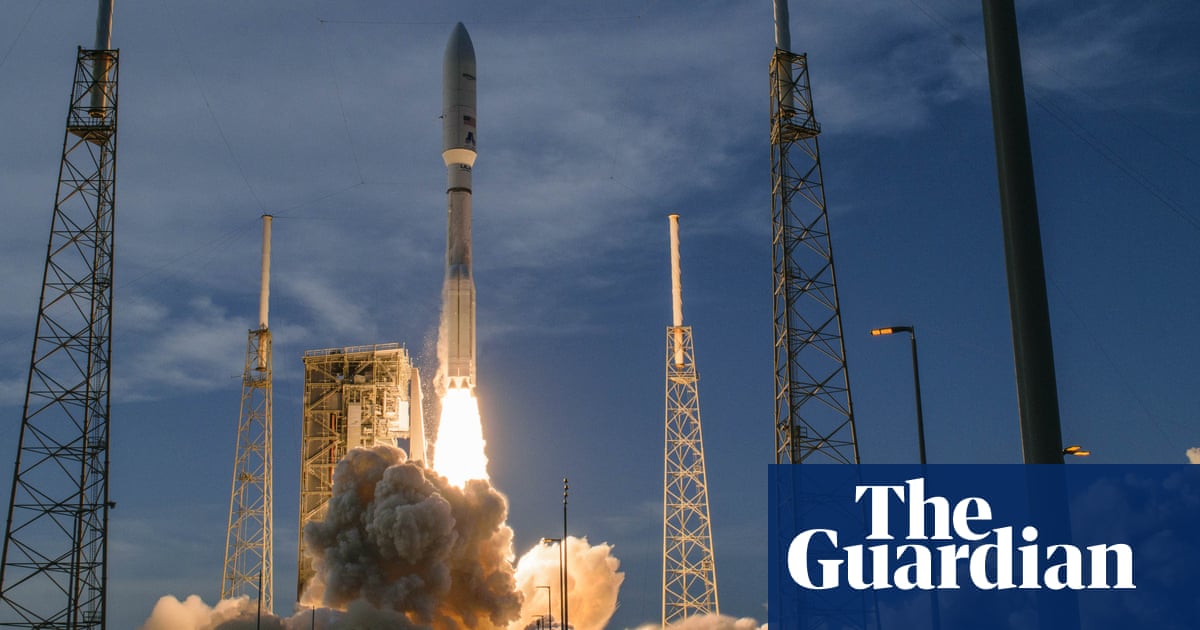The first 27 satellites for Amazon’s Kuiper broadband internet constellation were launched into space from Florida on Monday, kicking off the long-delayed deployment of an internet from space network that will rival SpaceX’s Starlink.
The satellites are the first of 3,236 thatAmazonplans to send into low-Earth orbit for Project Kuiper, a $10bn effort announced in 2019 to beam broadband internet globally for consumers, businesses and governments – customers that SpaceX has courted for years with its powerful Starlink business.
Sitting atop an Atlas V rocket from the Boeing and Lockheed Martin joint-venture United Launch Alliance, the batch of 27 satellites was lofted into space at 7pm EDT from the rocket company’s launch pad at the Cape CanaveralSpaceForce Station. Bad weather scrubbed an initial launch attempt on 9 April.
Kuiper is arguably Amazon’s biggest bet under way, pitting it against Starlink as well as global telecommunications providers like AT&T and T-Mobile. The company has positioned the service as a boon to rural areas where connectivity is sparse or nonexistent.
The mission to deploy the first operational satellites has been delayed more than a year – Amazon once hoped it could launch the inaugural batch in early 2024. The company faces a deadline set by the US Federal Communications Commission to deploy half its constellation, 1,618 satellites, by mid-2026, but its slower start means Amazon is likely to seek an extension, analysts say.
Hours or possibly days after the launch, Amazon is expected to publicly confirm initial contact with all of the satellites from its mission operations center in Redmond, Washington. If all goes as planned, the company said it expects to “begin delivering service to customers later this year”.
ULA could launch up to five more Kuiper missions this year, the ULA CEO, Tory Bruno, told Reuters in an interview this month. Amazon said in a 2020 FCC filing that it could begin service in some northern and southern regions at 578 satellites, with coverage expanding toward Earth’s equator as the company launches more satellites.
The web services and e-commerce giant’s Project Kuiper is an ambitious foray into space, with a late start in a market dominated by SpaceX. But Amazon executives see the company’s deep consumer product experience and established cloud computing business that Kuiper will connect with as an edge over Starlink.
Amazon launched two prototype satellites in 2023 in tests it said were successful, before de-orbiting them in 2024. It had been relatively quiet about the program’s development until announcing its first Kuiper launch plans earlier this month.
Elon Musk’s SpaceX, with a unique edge as both a satellite operator and launch company with its reusable Falcon 9, has put more than 8,000 Starlink satellites in orbit since 2019, marking its 250th dedicated Starlink launch on Monday. Its deployment pace has hastened to at least one Starlink mission a week, each rocket with roughly two dozen satellites on board to expand the network’s bandwidth and replace outdated satellites.
That quick pace has helped Musk’s company amass more than 5 million internet users across 125 countries, upend the global satellite communications market and woo military and intelligence agencies that have sought to use Starlink and its manufacturing line for sensitive national security programs.
The Amazon executive chair, Jeff Bezos, has voiced confidence that Kuiper can compete with Starlink, telling Reuters in a January interview “there’s insatiable demand” for internet.
Sign up toTechScape
A weekly dive in to how technology is shaping our lives
after newsletter promotion
“There’s room for lots of winners there. I predict Starlink will continue to be successful, and I predict Kuiper will be successful as well,” he said.
“It will be a primarily commercial system, but there will be defense uses for these LEO constellations, no doubt,” he added, referring to low-Earth orbit.
Amazon in 2023 revealed its Kuiper consumer terminals, an LP vinyl record-sized antenna that communicates with Kuiper satellites overhead, as well as a smaller terminal whose size it compares to its e-book Kindle device. The company expects to make tens of millions of the devices for under $400 each.
Amazon in 2022 booked 83 rocket launches from ULA, France’s Arianespace and Blue Origin, Bezos’s space company, snagging the industry’s biggest-ever launch deal as it prepared to begin Kuiper deployment.
